On Tuesday 21st May 2024, AINSE Scholar Gold Medals for excellence and impact in research were formally awarded to:
- Dr. Yanxiang Meng, former AINSE PGRA scholar from 2020 until the completion of his PhD in 2022 at the University of Melbourne; and
- Dr. Oliver Paull, former AINSE Honours Scholar in 2016 at the University of Wollongong, AINSE PGRA Scholar from 2017 to until the completion of his PhD in 2021 at The University of New South Wales, and 2019 SAAFE Scholar.
The Gold Medal ceremony was hosted from the AINSE Theatre and livestreamed via Zoom, with Dr. Paull and his family present in the Theatre and Dr. Meng joining remotely from Switzerland. Dr. Meng and Dr. Paull were presented with their medals by AINSE Managing Director Michelle Durant in front of an audience of AINSE member representatives and ANSTO researchers.
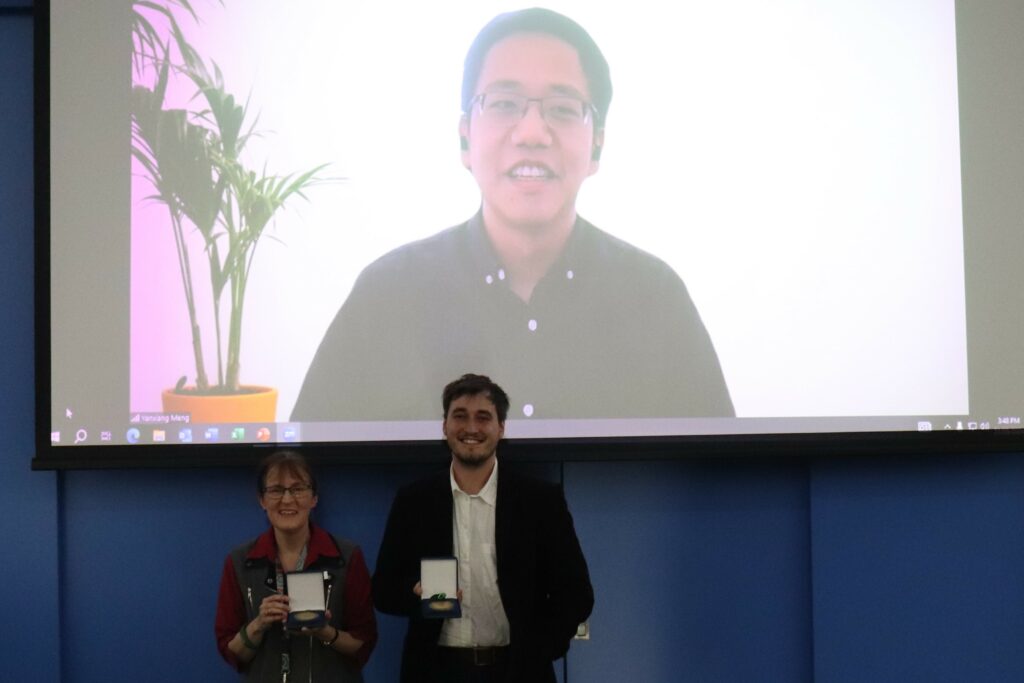
New insights to combat inflammatory disease
Dr Yanxiang Meng’s research investigated the molecular mechanisms of cell signalling during necroptosis. Necroptosis is a pro-inflammatory form of programmed cell death, which has been linked to inflammatory bowel disease, ischaemia-reperfusion injuries, and other inflammatory diseases.
RIPK1 is a small molecule that inhibits necroptosis by targeting the apical kinase in the pathway. This molecule has shown promising results in mouse models of non-infectious disease and is in phase II human clinical trials, triggering over $USD1billion in investment into the emerging class of necroptosis inhibiting drugs. However, therapeutically targeting the downstream effectors of necroptosis, RIPK3 kinase and MLKL pseudokinase, has been hindered by a lack of structural and mechanistic knowledge of these proteins. In addition, human and mouse necroptosis effectors are regulated differently, meaning interpreting the data generated in mouse disease models, for human drug development, is complicated.
Dr Meng’s research revealed the mechanisms by which the terminal effector of necroptosis, MLKL, is activated by RIPK3. By characterizing the interactions and structures of RIPK3 and MLKL using the SAXS/WAXS and MX2 beamlines at the Australian Synchrotron in a series of high impact research papers, Dr Meng has revealed the structural basis by which RIPK3 and MLKL are regulated in human cells for the first time. This knowledge is necessary to design novel therapeutic agents to inhibit RIPK3 and MLKL, which have enormous potential to generate positive clinical outcomes for patients worldwide who are suffer with inflammatory diseases, as well as the strong potential commercial value in a billion-dollar drug market.
A revolution in information storage
Dr. Oliver Paull’s research focused on the development of a new class of functional materials called multiferroics. These materials harbour both magnetic and dipolar charge properties and directly address these challenges associated with our consumption of energy.
Whilst significant emphasis has already been placed on researching energy generation, the consumption demands of energy is one of the defining challenges of the 21st century. Information and Communications Technology (ICT) currently consumes approximately 10% of the world’s energy supply, and this is expected to double every ~10 years. If this goes unchecked, it will create an untenable situation where a large fraction of our primary energy is used simply for ICT functions. Dr. Oliver Paull’s research, published across numerous high impact journals, addresses these issues through developing our understanding of multiferroic materials.
Specifically, Dr. Paull worked on bismuth ferrite, a materials system offering attractive functional properties including robust multiferroicity, lead-free chemical nature and high temperature stability. Dr. Paull demonstrated a special crystal growth technique that identified a new low symmetry phase of bismuth ferrite which required significantly lower input bias for operation. This new phase showed an electromechanical response 500% of the traditionally used form. Following that, he outlined the interdependence between the lattice strain state and magnetic spin textures. He also visited the Centrale Supélec, Paris as a SAAFE awardee, to develop bismuth ferrite based thin films as lead-free environmentally friendly sensor materials. Finally, Dr. Paull’s research also contributed to designing new multiferroic phases of bismuth ferrite with topological properties, and these have the potential to revolutionise how information is sorted and read.
AINSE wishes to congratulate Dr. Meng and Dr. Paull on their outstanding accomplishments, and eagerly anticipates the outcomes of their next research endeavours.
The 2024 AINSE Networking Dinner
Following the Gold Medal Ceremony, AINSE’s hosted its annual networking dinner to bring together representatives from the Australasian nuclear science and technology sector.
AINSE member representatives from across Australia and New Zealand met with members of the AINSE and ANSTO Boards, representatives from ARWA, ARPANSA, the ANA, ATSE, and AusYGN, alongside AINSE alumni and ANSTO researchers, at the Sydney Masonic Centre.
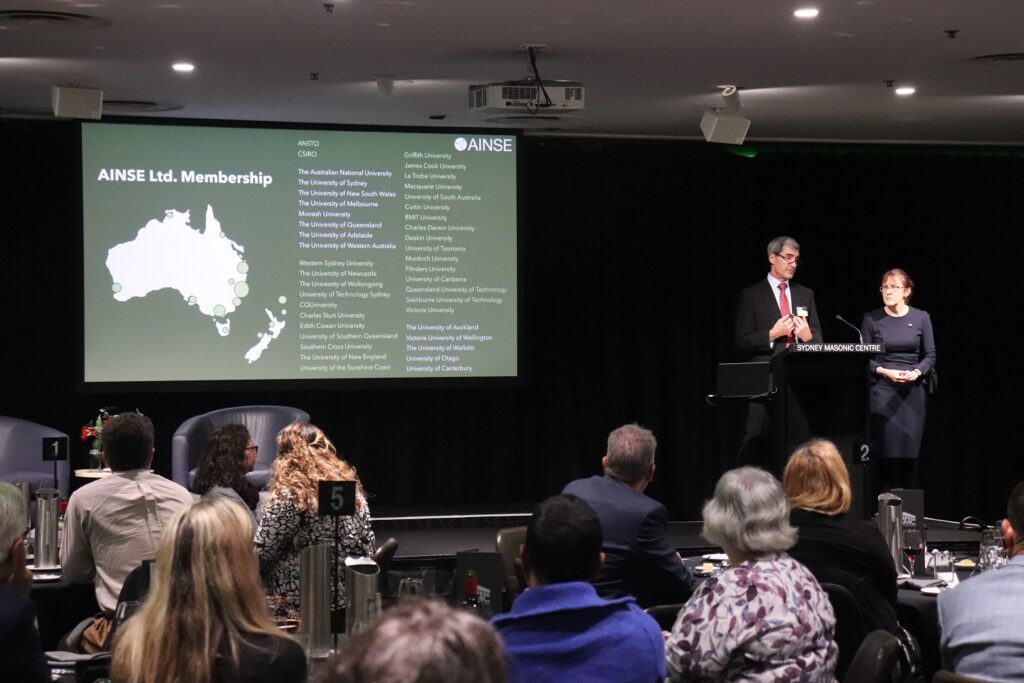
AINSE President Prof. Ian Gentle and Managing Director Michelle Durant welcomed the distinguished guests to the evening, noting the unique networking opportunities afforded by this unique gathering of representatives from across the vast majority of the Australasian nuclear science and technology sector, and speaking to recent developments over the past 12 months.
Gold Medal recipient Dr. Oliver Paull shared his AINSE-supported research into multiferroic materials with the assembled guests over dinner, in an extended conversation with Prof. Ian Gentle. Dr. Paull also detailed his experience with the Scholarship AINSE ANSTO French Embassies (SAAFE) research exchange internship, and his associated visit to the Centrale Supélec, Paris, during his Ph.D. research.
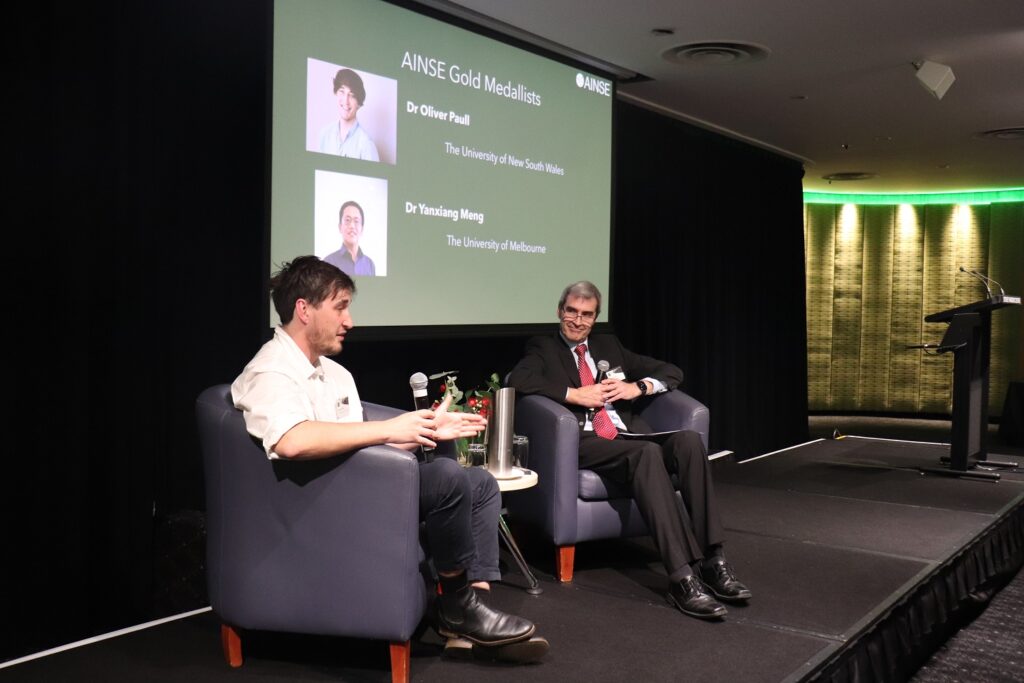
Throughout the evening, select AINSE Member Representatives and ANSTO staff were acknowledged for their outstanding service to AINSE over the past 12 months. Service awards were presented to:
- Adam Barry (ANSTO)
- Michelle Crockett (ANSTO)
- A/Professor Vladimir Golovko (University of Canterbury)
- Professor Lingxue Kong (Deakin University)
- Brett Rowling (ANSTO)
- Dr Jamie Schulz (ANSTO)
- Dr Aaron Seeber (CSIRO)
- Professor Chris Sumby (The University of Adelaide)
- Professor Gordon Thorogood (ANSTO)
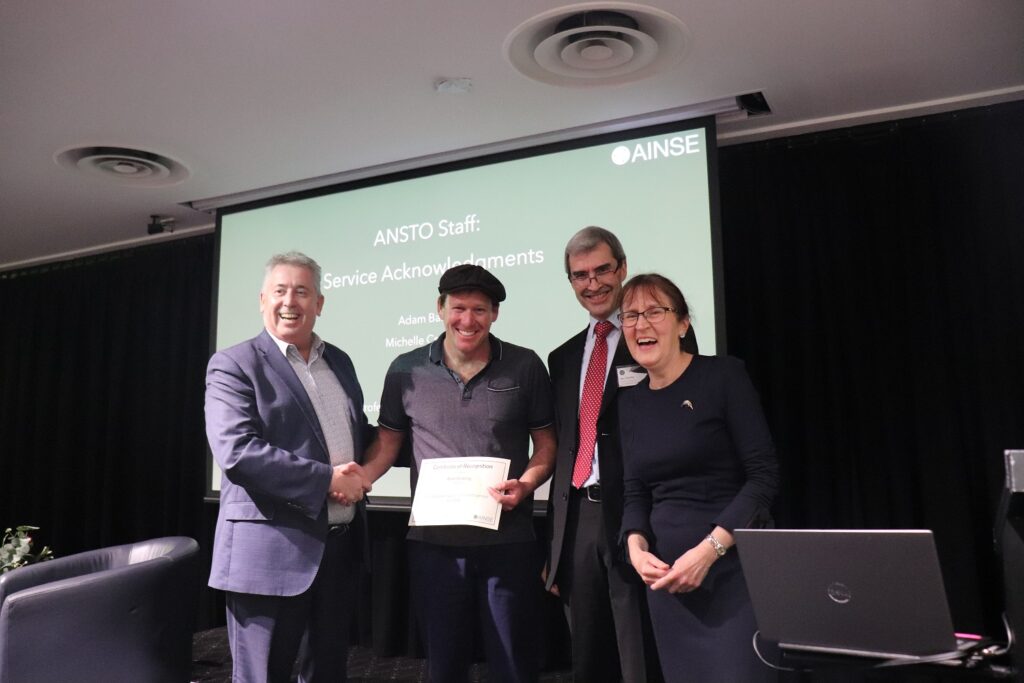
AINSE staff member Nerissa Phillips received special acknowledgement for her 30 years of service to AINSE, over which time she has provided assistance and support to many hundreds of undergraduate and postgraduate students and researchers on AINSE scholarships and awards.
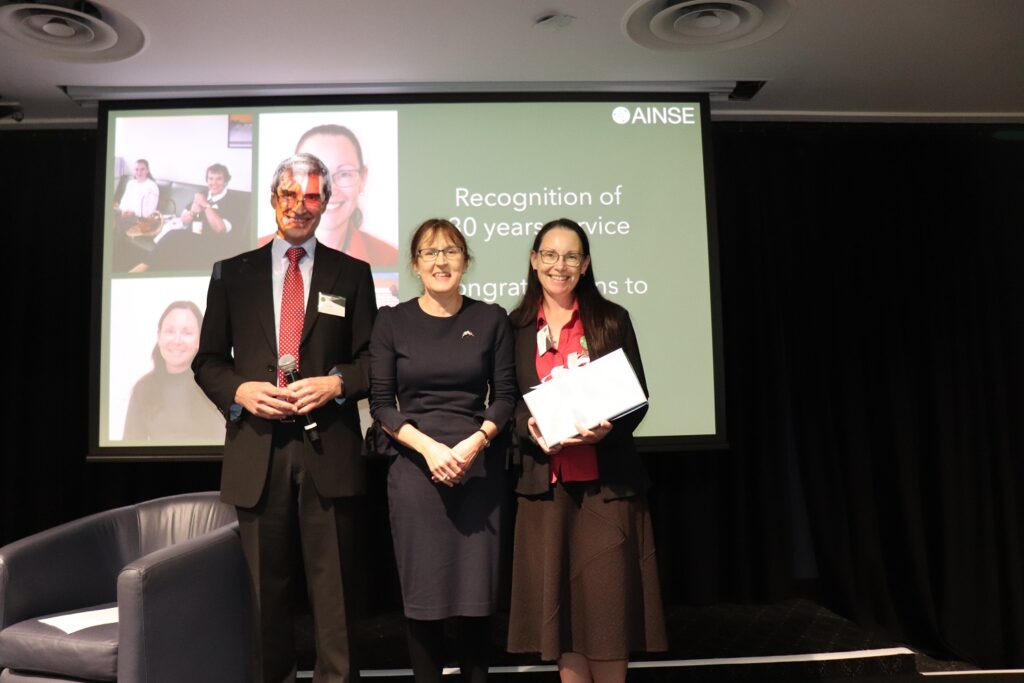
AINSE Managing Director Michelle Durant celebrated the success of the second annual AINSE Networking dinner and looked forward to future opportunities for AINSE to foster further connections within the Australasian nuclear science and technology sector.
“It was an honour to be able to connect with so many people in the nuclear science and engineering sector this week, sparking many insightful discussions about existing and possible new collaborations”, said Michelle.
“In addition, it was a pleasure to acknowledge a number of individuals for their outstanding service to AINSE.”
Nominations for 2024 AINSE Scholar Gold Medals will be received until 31st August 2024.
